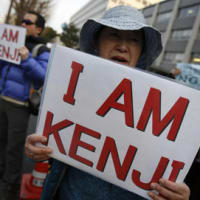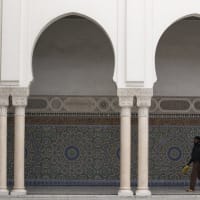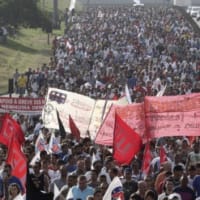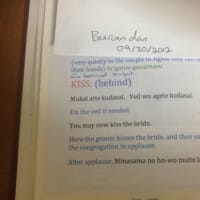In Spanish Village, Everyone’s a Winner, Almost
スペインの村で、皆が宝くじに当選! と言いたいが・・
スペインの宝くじは世界的に当選賞金が高くて有名だという。国民もクリスマスはこの宝くじで盛り上がるらしい。 貧しい寒村の住人(全員-1)が当選という夢のようなお話。みなさん大事に使ってね。うらやましく思うけど、こういう話があってもいいですね。貧しい村がみんなでハッピーになる。 夢からこぼれた一人は・・・・
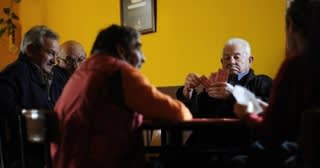
After winning Spain's Christmas lottery, residents of Sodeto have time for leisurely pursuits. スペインのクリスマス宝くじに当たったあと、ソデトの住民はレジャーをして過ごす日々だ。
By SUZANNE DALEY
Published: January 31, 2012
SODETO, Spain — Just a few weeks ago, the 70 households in this isolated farming village were struggling under the double whammy of Spain’s economic downturn and the ravages of a severe drought.
2~3週間前、70世帯足らずの孤立した農村はスペインの経済悪化と干ばつの被害のダブルパンチに喘いでいた。
Some were even thinking of passing up Spain’s huge Christmas lottery, known as El Gordo — the fat one — which is something of a national obsession. But they bought tickets out of loyalty to the homemakers’ association here, which makes a small percentage on the sales. And then, their number came in. All but one household in Sodeto held at least a piece of a winning ticket in the lottery’s huge first prize, $950 million, the biggest ever. Some of Sodeto’s residents, mostly farmers and unemployed construction workers, won millions. The least fortunate came away with a minimum of $130,000 — and the giddy feeling that life, in its mysterious ways, was giving them another chance.
ある者はエル・ゴルド(太っちょ)として知られる、このスペイン最大のクリスマス宝くじを買い控えしようとさえ考えていた。当たるとでかい宝くじで、国中が熱中する恒例の宝くじである。 しかし、彼等は、この村の住宅建設会社組合の売り上げの僅かなパーセンテージのロイヤリティのなかからチケットを購入していた。 そして彼らの番号が来たのだ。 ソデトの1世帯を除くすべての人がこれまでの最高額の一等9億5千万ドルの当たり券の少なくとも一枚の当たり券を得たのだ。 殆どが農民か臨時建設労働者というソデトの住民の幾人かは億万長者になったのである。 一番当たり額の少ない人でも、最低13万ドルを当てている。 そしてこの目も眩むような人生の体験は不思議なことに二度目となる。
It is one of the rare bits of happy news amid the relentlessly gloomy European economic crisis, in which Spain has been one of the hardest of the hard-luck cases. But it has not come without its own cost: the village, until now just a dot on the map about three hours northwest of Barcelona, has been inundated with salespeople and fortune seekers ever since. On a recent morning, the vendors just kept showing up: bankers in suits offering high interest rates, car salesmen talking up BMWs and furniture dealers going door to door.
それは、スペインが不運なケースで最悪になる国々の1か国として扱われている、過酷で暗い欧州の経済危機の最中にあって、数少ないハッピーニュースのひとつである。 しかし、なんにしろ、厄介なことはつきまとうものである。 今まではバルセロナの北西に3時間ほどの地図上の点にしか過ぎなかったその村に、そのニュース以来、セールスマンやおこぼれにあずかりたい人が押しかけている。 最近の朝など、業者が居座り続けている、スーツを着込んだ銀行マンが高金利商品を売り込んだり、車のセールスマンがBMWの話を持ち込んだり、そして家具業者が各家庭を回っている。
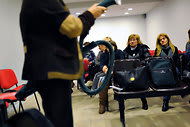
The residents of Sodeto, Spain, now wealthy, attract salespeople. スペイン、ソデトの住民は今や裕福になり、セールスマンのターゲットとなっている。
Like many other local farmers, José Manuel Penella Cambra, who had recently invested in more efficient irrigation techniques, worried about how he would meet his payments. But his wife bought two tickets, worth $260,000, and his son found two more she had bought earlier and had forgotten about, bringing the total to $520,000. “I kept saying: look for some more, look for some more,” he joked in the village cafe, a shabby establishment with a few Formica tables and a ripped black leatherette sofa. “But this money means that now we can breathe. And the best part is that it isn’t just me. Everybody won.”
他の地元の農家の人と同様に、ホセ・マヌエル・ペネラ・キャムブラは最近性能のいい灌漑技術に投資していたが、その支払いに苦慮していた。 しかし彼の妻は2枚の宝くじを購入しており、26万ドルになった、さらに彼の息子が、彼女がそれ以前に購入して忘れていた2枚のくじを見つけたので合計52万ドルにもなったのである。 「僕は、まだないか? まだないか?って言い続けていたよ」と彼は、2~3台の合成樹脂製テーブルと破れた合成皮革ソファという安っぽい内装の村のカフェでジョーク混じりに話していた。「だけど、この金で村は一息つけるんだよ。 それに僕だけじゃなく村の誰もが潤ったってのが最高だね。」
The day of the lottery announcement was collective madness, the residents said, as they realized how many of their neighbors had won, too. As news spread, the farmers raced into town on their tractors. The mayor, Rosa Pons, used a megaphone to congratulate everyone. Anica Bordei, the cafe manager, ran into the street with her socks on, even though they had holes in the toes. In what seemed like 20 minutes, the bankers were on hand to collect the tickets and then the local news media showed up. “Some of the ladies talked about going to the hairdresser,” Mayor Pons said. “But the hairdresser won, too. And she said, ‘I’m not working today.’ So that ended that.”
宝くじの発表の日は、近所の皆がどれだけ当たったか知って、集団パニック状態だったと住人は話している。 ニュースが広がるにつれて、農民がトラクターで町にどっと押しかけてきて、市長のローザ・ポンスがスピーカーでお祝いの言葉を皆にかけ、カフェの主人、アニカ・ボルデイはかかとに穴が空いている靴下のまま通りに飛び出してきた。 20分ほどで銀行の人が当たり券を回収にきて、すぐに地方のメディアが取材に来た。「女の人の数人が美容院に行こうと話していたけど、美容院のオーナーも当たったので、彼女は“今日は仕事や~めた”と言って、その話はそれでだめになったわ」とポンス市長は話している。
The lottery, first established in 1812, is a huge event in Spain. Many people take the morning off to watch the televised coverage of the numbers being drawn from a gilded spinning cage. Spain’s lottery works differently from those in the United States. This year there were 1,800 first-prize-winning tickets with the same number, 58268, each paying $520,000. As the tickets cost $26 each, they are often broken down into $6.50 “participations.” The Sodeto homemakers’ association sells the tickets every year and usually nets about $1,300, which it uses to pay for food and decorations during local festivals. (It gets a small percentage of every ticket sold.) This year the tickets the women sold, here and in visits to 17 neighboring villages, brought in more than $150 million in winnings.
宝くじは1812年に始まり、スペインの大きな行事の一つとなった。 多くの人々は金の籠から抽選される数字のテレビ放送を見るために午前中の仕事を休んでいる。 スペインの宝くじはアメリカの宝くじとは異なっている。 今年は番号58268番で1800人の一等賞が出ており、それぞれ52万ドルが支払われる。 チケット束は26ドルするので、しばしば6.5ドルずつに分けて購入する人たちもいる。 ソデトの住宅建築協会は毎年宝くじを販売しており、通常利益が約1300ドルになり、それは現地のお祭りの装飾や食事代に使われている。(それは各チケットのほんの少しのパーセントだ) 今年は女性達が販売した宝くじは17の近隣の村を訪問して販売され、それらが1億5千万ドルの賞金をもたらしたことになる。

Ads for luxury goods, new houses and a trip to the Caribbean posted in Sodeto. 贅沢品や新しい家、そしてカリブ海旅行の広告がソデト村の郵便受けには一杯はいるようになった。
Even now, the residents of Sodeto are prone to giggling when they retell the stories of where were when they heard, and how they almost did not buy any tickets, or how someone’s grandmother had a secret stash of tickets tucked away in her purse. But selling the tickets was difficult this year. Even the cheapest “participations” were expensive for some. At one point, Mari Carmen Lambea, a member of the homemakers’ association, tried to sell a ticket to a friend whose husband was unemployed. But her friend could only promise to pay her later. When the number was called, the friend still had not paid. But Ms. Lambea had saved the ticket for her anyway.
今でも、ソデトの住民たちは、当選の話を聞いたときどこにいたか、どうして、危うく宝くじを買わないところだったか、はたまた誰かのお婆さんがこっそり宝くじの束を隠したかなど思い出して語るとき笑いをこらえきれない状態だ。 しかし、今年は宝くじを売るのはとても難しかった。 一番安い宝くじの購入でさえ、人によっては高い買い物だったのです。 あるところで、住宅建築協会の会員のマリ・カルメン・ラムベアは宝くじを、ご主人が失業中の友達に販売しようとしていた。 ところが彼女の友達は後払いしか約束できなかった。 当選が分ったとき、その友達はまだ支払いを済ませていませんでした。 しかし、ランベアは彼女のためにとにかく宝くじを買っておきました。
“She was afraid to call me and ask,” Ms. Lambea said. “So her son called my son and asked him whether I had really saved the ticket, and I said, ‘Of course, I did.’ And then there was a lot of crying.” So far, though, no one has splurged on anything much, Mayor Pons said. “Are you going to see Mercedes going up and down our streets?” she said. “I don’t think so. People are going to invest in the fields and maybe a sofa.” The mayor said that most residents of the village — a planned community built in the 1960s as part of the government’s ambitious efforts to improve agricultural production by cultivating unused, often arid land — were hoping that things could get back to normal soon. It used to be a place where every door was unlocked. But no more.
「彼女は私に尋ねる電話を入れるのを怖がっていました。 それで彼女の息子が私の息子に電話を入れて私が本当に宝くじを買っているかどうか尋ねたのです。 “もちろん買っていたわ” そして、後は涙涙よ」とランベアさんは話した。 だけど、今のところは、誰もそんなに散財していないわとポンス市長は話している。 「メルセーデスが通りを往き来しているのを見ましたか? そうではないでしょう、人々は畑や多分、ソファにお金を使っていると思いますよ。」と彼女は言う。 市長は、村の殆どの住民(これらの村は、使われずに、多くの場合乾燥した土地を耕すことによって農業生産を改善する国の野心的努力の一部として1960年代に建設された計画開拓村であるが)は事態がまた普段の日常を取り戻すことを望んでいると言う。 かつてはどこも家に鍵などかけない村だったが、それもかなわなくなった。

Sodeto has 250 residents, down from 400 in the 1960s. ソデトは1960年代400人いた住人が、今は250人までに減少している。
As Ms. Lambea headed home from the cafe recently, she spotted the familiar car of a particularly determined banker. “Oh no,” she said, ducking out of his line of sight. “I’m turning off my phone.” Some like Mr. Penella, the farmer, hope that the money will help keep the next generation, in particular his son, in the village. In the 1960s, Sodeto had 400 residents. But nowadays, only 250 people live here. Young people have moved on. The only resident who did not win was Costis Mitsotakis, a Greek filmmaker, who moved to the village for love of a woman. It did not work out. But he still lives here in a barn he is restoring about half a mile outside the village. Somehow, the homemakers had overlooked him this year as they made the rounds. Mr. Mitsotakis said it would have been nice to win. But he has benefited nonetheless. He had been trying to sell some land without much success. The day after the lottery a neighbor called to say he would buy it. The next day another neighbor called. But Mr. Mitsotakis refused to get into a bidding war.
ランベアさんが最近カフェから家に向かっていたとき、彼女は、ご執心な銀行マンの見慣れた車を見つけて、「あらまずいわ」と言って、見つからないように身を屈めた。 「電話を切っていたのよ」 農家のペネラさんのような人は、お金を次の世代、特に村の息子ためにとっておくでしょう。 1960年代にソデトには400人お住民がいました。 しかし、いまは250人しか住んでいません。 若い人は流出し続けています。 村で一人宝くじを買わなかったのはコスティス・ミツォオテキスさんだ、ギリシャの映画製作者である女性に恋をしてこの村にやってきました。 恋は成就しませんでしたが、彼はここの改築した村はずれの納屋に住み続けている。 どういうわけか、住宅建設会社は今年宝くじを販売して回るときに彼を見落としていました。 ミツォオテキス氏は当たったら良かったのにと言っているが、彼は“おこぼれ”にはあずかっているのです。 彼は土地を売ろうとして上手くいかなかったのですが、この宝くじの発表の後で、ご近所から電話が入り土地を売ることができたのです。 翌日には別の電話が入りましたが、彼は二人を天秤にかけることはしませんでした。
“This is a small village,” he said. “You don’t want bad feelings.”
「ここは小さな村です。 嫌な感情を生むようなことはしたくないですからね」と彼は言っている。

Costis Mitsotakis, a filmmaker, is the only resident of Sodeto who did not win a piece of the winning ticket. 映画製作者のコスティス・ミツォカキスはソデトに住む住人で唯一宝くじのチケットが当たらなかった人物だ。
Rachel Chaundler contributed reporting.
スペインの村で、皆が宝くじに当選! と言いたいが・・
スペインの宝くじは世界的に当選賞金が高くて有名だという。国民もクリスマスはこの宝くじで盛り上がるらしい。 貧しい寒村の住人(全員-1)が当選という夢のようなお話。みなさん大事に使ってね。うらやましく思うけど、こういう話があってもいいですね。貧しい村がみんなでハッピーになる。 夢からこぼれた一人は・・・・

After winning Spain's Christmas lottery, residents of Sodeto have time for leisurely pursuits. スペインのクリスマス宝くじに当たったあと、ソデトの住民はレジャーをして過ごす日々だ。
By SUZANNE DALEY
Published: January 31, 2012
SODETO, Spain — Just a few weeks ago, the 70 households in this isolated farming village were struggling under the double whammy of Spain’s economic downturn and the ravages of a severe drought.
2~3週間前、70世帯足らずの孤立した農村はスペインの経済悪化と干ばつの被害のダブルパンチに喘いでいた。
Some were even thinking of passing up Spain’s huge Christmas lottery, known as El Gordo — the fat one — which is something of a national obsession. But they bought tickets out of loyalty to the homemakers’ association here, which makes a small percentage on the sales. And then, their number came in. All but one household in Sodeto held at least a piece of a winning ticket in the lottery’s huge first prize, $950 million, the biggest ever. Some of Sodeto’s residents, mostly farmers and unemployed construction workers, won millions. The least fortunate came away with a minimum of $130,000 — and the giddy feeling that life, in its mysterious ways, was giving them another chance.
ある者はエル・ゴルド(太っちょ)として知られる、このスペイン最大のクリスマス宝くじを買い控えしようとさえ考えていた。当たるとでかい宝くじで、国中が熱中する恒例の宝くじである。 しかし、彼等は、この村の住宅建設会社組合の売り上げの僅かなパーセンテージのロイヤリティのなかからチケットを購入していた。 そして彼らの番号が来たのだ。 ソデトの1世帯を除くすべての人がこれまでの最高額の一等9億5千万ドルの当たり券の少なくとも一枚の当たり券を得たのだ。 殆どが農民か臨時建設労働者というソデトの住民の幾人かは億万長者になったのである。 一番当たり額の少ない人でも、最低13万ドルを当てている。 そしてこの目も眩むような人生の体験は不思議なことに二度目となる。
It is one of the rare bits of happy news amid the relentlessly gloomy European economic crisis, in which Spain has been one of the hardest of the hard-luck cases. But it has not come without its own cost: the village, until now just a dot on the map about three hours northwest of Barcelona, has been inundated with salespeople and fortune seekers ever since. On a recent morning, the vendors just kept showing up: bankers in suits offering high interest rates, car salesmen talking up BMWs and furniture dealers going door to door.
それは、スペインが不運なケースで最悪になる国々の1か国として扱われている、過酷で暗い欧州の経済危機の最中にあって、数少ないハッピーニュースのひとつである。 しかし、なんにしろ、厄介なことはつきまとうものである。 今まではバルセロナの北西に3時間ほどの地図上の点にしか過ぎなかったその村に、そのニュース以来、セールスマンやおこぼれにあずかりたい人が押しかけている。 最近の朝など、業者が居座り続けている、スーツを着込んだ銀行マンが高金利商品を売り込んだり、車のセールスマンがBMWの話を持ち込んだり、そして家具業者が各家庭を回っている。

The residents of Sodeto, Spain, now wealthy, attract salespeople. スペイン、ソデトの住民は今や裕福になり、セールスマンのターゲットとなっている。
Like many other local farmers, José Manuel Penella Cambra, who had recently invested in more efficient irrigation techniques, worried about how he would meet his payments. But his wife bought two tickets, worth $260,000, and his son found two more she had bought earlier and had forgotten about, bringing the total to $520,000. “I kept saying: look for some more, look for some more,” he joked in the village cafe, a shabby establishment with a few Formica tables and a ripped black leatherette sofa. “But this money means that now we can breathe. And the best part is that it isn’t just me. Everybody won.”
他の地元の農家の人と同様に、ホセ・マヌエル・ペネラ・キャムブラは最近性能のいい灌漑技術に投資していたが、その支払いに苦慮していた。 しかし彼の妻は2枚の宝くじを購入しており、26万ドルになった、さらに彼の息子が、彼女がそれ以前に購入して忘れていた2枚のくじを見つけたので合計52万ドルにもなったのである。 「僕は、まだないか? まだないか?って言い続けていたよ」と彼は、2~3台の合成樹脂製テーブルと破れた合成皮革ソファという安っぽい内装の村のカフェでジョーク混じりに話していた。「だけど、この金で村は一息つけるんだよ。 それに僕だけじゃなく村の誰もが潤ったってのが最高だね。」
The day of the lottery announcement was collective madness, the residents said, as they realized how many of their neighbors had won, too. As news spread, the farmers raced into town on their tractors. The mayor, Rosa Pons, used a megaphone to congratulate everyone. Anica Bordei, the cafe manager, ran into the street with her socks on, even though they had holes in the toes. In what seemed like 20 minutes, the bankers were on hand to collect the tickets and then the local news media showed up. “Some of the ladies talked about going to the hairdresser,” Mayor Pons said. “But the hairdresser won, too. And she said, ‘I’m not working today.’ So that ended that.”
宝くじの発表の日は、近所の皆がどれだけ当たったか知って、集団パニック状態だったと住人は話している。 ニュースが広がるにつれて、農民がトラクターで町にどっと押しかけてきて、市長のローザ・ポンスがスピーカーでお祝いの言葉を皆にかけ、カフェの主人、アニカ・ボルデイはかかとに穴が空いている靴下のまま通りに飛び出してきた。 20分ほどで銀行の人が当たり券を回収にきて、すぐに地方のメディアが取材に来た。「女の人の数人が美容院に行こうと話していたけど、美容院のオーナーも当たったので、彼女は“今日は仕事や~めた”と言って、その話はそれでだめになったわ」とポンス市長は話している。
The lottery, first established in 1812, is a huge event in Spain. Many people take the morning off to watch the televised coverage of the numbers being drawn from a gilded spinning cage. Spain’s lottery works differently from those in the United States. This year there were 1,800 first-prize-winning tickets with the same number, 58268, each paying $520,000. As the tickets cost $26 each, they are often broken down into $6.50 “participations.” The Sodeto homemakers’ association sells the tickets every year and usually nets about $1,300, which it uses to pay for food and decorations during local festivals. (It gets a small percentage of every ticket sold.) This year the tickets the women sold, here and in visits to 17 neighboring villages, brought in more than $150 million in winnings.
宝くじは1812年に始まり、スペインの大きな行事の一つとなった。 多くの人々は金の籠から抽選される数字のテレビ放送を見るために午前中の仕事を休んでいる。 スペインの宝くじはアメリカの宝くじとは異なっている。 今年は番号58268番で1800人の一等賞が出ており、それぞれ52万ドルが支払われる。 チケット束は26ドルするので、しばしば6.5ドルずつに分けて購入する人たちもいる。 ソデトの住宅建築協会は毎年宝くじを販売しており、通常利益が約1300ドルになり、それは現地のお祭りの装飾や食事代に使われている。(それは各チケットのほんの少しのパーセントだ) 今年は女性達が販売した宝くじは17の近隣の村を訪問して販売され、それらが1億5千万ドルの賞金をもたらしたことになる。

Ads for luxury goods, new houses and a trip to the Caribbean posted in Sodeto. 贅沢品や新しい家、そしてカリブ海旅行の広告がソデト村の郵便受けには一杯はいるようになった。
Even now, the residents of Sodeto are prone to giggling when they retell the stories of where were when they heard, and how they almost did not buy any tickets, or how someone’s grandmother had a secret stash of tickets tucked away in her purse. But selling the tickets was difficult this year. Even the cheapest “participations” were expensive for some. At one point, Mari Carmen Lambea, a member of the homemakers’ association, tried to sell a ticket to a friend whose husband was unemployed. But her friend could only promise to pay her later. When the number was called, the friend still had not paid. But Ms. Lambea had saved the ticket for her anyway.
今でも、ソデトの住民たちは、当選の話を聞いたときどこにいたか、どうして、危うく宝くじを買わないところだったか、はたまた誰かのお婆さんがこっそり宝くじの束を隠したかなど思い出して語るとき笑いをこらえきれない状態だ。 しかし、今年は宝くじを売るのはとても難しかった。 一番安い宝くじの購入でさえ、人によっては高い買い物だったのです。 あるところで、住宅建築協会の会員のマリ・カルメン・ラムベアは宝くじを、ご主人が失業中の友達に販売しようとしていた。 ところが彼女の友達は後払いしか約束できなかった。 当選が分ったとき、その友達はまだ支払いを済ませていませんでした。 しかし、ランベアは彼女のためにとにかく宝くじを買っておきました。
“She was afraid to call me and ask,” Ms. Lambea said. “So her son called my son and asked him whether I had really saved the ticket, and I said, ‘Of course, I did.’ And then there was a lot of crying.” So far, though, no one has splurged on anything much, Mayor Pons said. “Are you going to see Mercedes going up and down our streets?” she said. “I don’t think so. People are going to invest in the fields and maybe a sofa.” The mayor said that most residents of the village — a planned community built in the 1960s as part of the government’s ambitious efforts to improve agricultural production by cultivating unused, often arid land — were hoping that things could get back to normal soon. It used to be a place where every door was unlocked. But no more.
「彼女は私に尋ねる電話を入れるのを怖がっていました。 それで彼女の息子が私の息子に電話を入れて私が本当に宝くじを買っているかどうか尋ねたのです。 “もちろん買っていたわ” そして、後は涙涙よ」とランベアさんは話した。 だけど、今のところは、誰もそんなに散財していないわとポンス市長は話している。 「メルセーデスが通りを往き来しているのを見ましたか? そうではないでしょう、人々は畑や多分、ソファにお金を使っていると思いますよ。」と彼女は言う。 市長は、村の殆どの住民(これらの村は、使われずに、多くの場合乾燥した土地を耕すことによって農業生産を改善する国の野心的努力の一部として1960年代に建設された計画開拓村であるが)は事態がまた普段の日常を取り戻すことを望んでいると言う。 かつてはどこも家に鍵などかけない村だったが、それもかなわなくなった。

Sodeto has 250 residents, down from 400 in the 1960s. ソデトは1960年代400人いた住人が、今は250人までに減少している。
As Ms. Lambea headed home from the cafe recently, she spotted the familiar car of a particularly determined banker. “Oh no,” she said, ducking out of his line of sight. “I’m turning off my phone.” Some like Mr. Penella, the farmer, hope that the money will help keep the next generation, in particular his son, in the village. In the 1960s, Sodeto had 400 residents. But nowadays, only 250 people live here. Young people have moved on. The only resident who did not win was Costis Mitsotakis, a Greek filmmaker, who moved to the village for love of a woman. It did not work out. But he still lives here in a barn he is restoring about half a mile outside the village. Somehow, the homemakers had overlooked him this year as they made the rounds. Mr. Mitsotakis said it would have been nice to win. But he has benefited nonetheless. He had been trying to sell some land without much success. The day after the lottery a neighbor called to say he would buy it. The next day another neighbor called. But Mr. Mitsotakis refused to get into a bidding war.
ランベアさんが最近カフェから家に向かっていたとき、彼女は、ご執心な銀行マンの見慣れた車を見つけて、「あらまずいわ」と言って、見つからないように身を屈めた。 「電話を切っていたのよ」 農家のペネラさんのような人は、お金を次の世代、特に村の息子ためにとっておくでしょう。 1960年代にソデトには400人お住民がいました。 しかし、いまは250人しか住んでいません。 若い人は流出し続けています。 村で一人宝くじを買わなかったのはコスティス・ミツォオテキスさんだ、ギリシャの映画製作者である女性に恋をしてこの村にやってきました。 恋は成就しませんでしたが、彼はここの改築した村はずれの納屋に住み続けている。 どういうわけか、住宅建設会社は今年宝くじを販売して回るときに彼を見落としていました。 ミツォオテキス氏は当たったら良かったのにと言っているが、彼は“おこぼれ”にはあずかっているのです。 彼は土地を売ろうとして上手くいかなかったのですが、この宝くじの発表の後で、ご近所から電話が入り土地を売ることができたのです。 翌日には別の電話が入りましたが、彼は二人を天秤にかけることはしませんでした。
“This is a small village,” he said. “You don’t want bad feelings.”
「ここは小さな村です。 嫌な感情を生むようなことはしたくないですからね」と彼は言っている。

Costis Mitsotakis, a filmmaker, is the only resident of Sodeto who did not win a piece of the winning ticket. 映画製作者のコスティス・ミツォカキスはソデトに住む住人で唯一宝くじのチケットが当たらなかった人物だ。
Rachel Chaundler contributed reporting.














